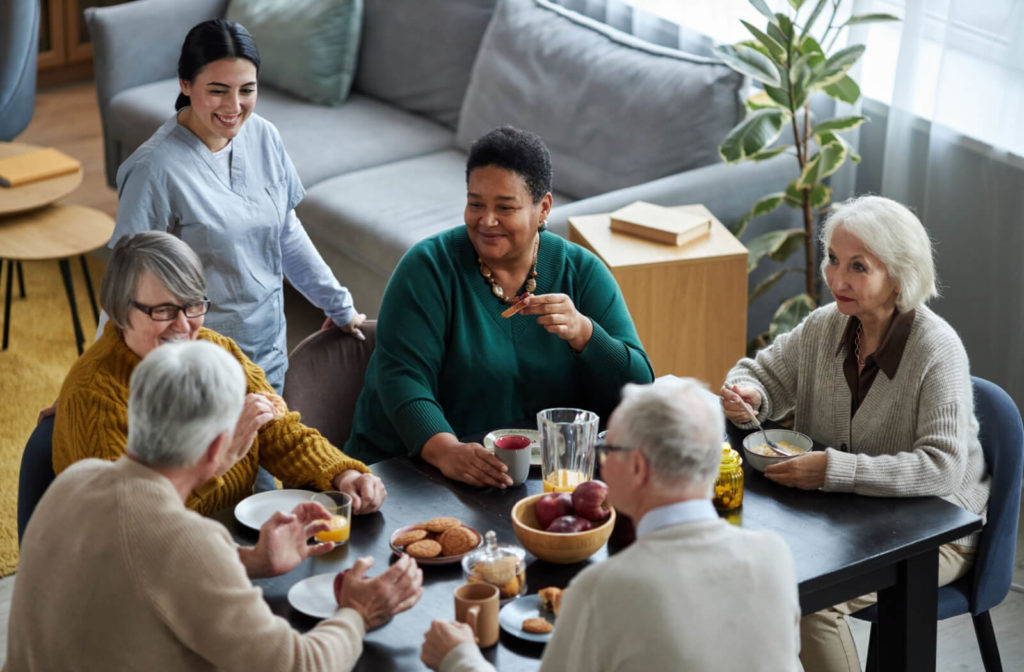Learn about personalized Assisted Living plans for elderly residents.
Learn about personalized Assisted Living plans for elderly residents.
Blog Article
Aided Living: a Compassionate Environment for Senior Citizens With Memory Obstacles
By providing individualized care and structured regimens, these communities not only improve cognitive function but also foster psychological links, decreasing isolation amongst residents. The effectiveness of these interventions typically hinges on the involvement of family members in the treatment procedure, triggering a more detailed examination of how this collective initiative affects outcomes for both residents and loved ones.
Recognizing Memory Obstacles
Comprehending memory challenges is crucial for supplying reliable like senior citizens dealing with cognitive decline. Memory problems, which can show up as lapse of memory, complication, or trouble recalling recent events, are frequently symptoms of problems such as Alzheimer's disease or various other kinds of dementia. These difficulties can considerably influence an elderly's capability to do everyday tasks, maintain social relationships, and take care of personal safety and security.
Recognizing the different stages of cognitive decrease is crucial for caregivers and healthcare specialists. Early-stage amnesia may involve light forgetfulness, while mid-stage decrease can cause more noticable disorientation and confusion. In late-stage mental deterioration, people might lose the capability to communicate successfully, needing detailed support and understanding from caregivers.
This requires a thoughtful strategy to care that prioritizes the psychological well-being of the individual. Inevitably, a deep understanding of these difficulties is fundamental to supplying compassionate and efficient treatment for seniors facing cognitive decrease.
Benefits of Assisted Living
Aided living offers countless advantages for senior citizens with memory challenges, supplying an encouraging setting that cultivates freedom while making certain safety and security and care. One of the primary advantages is the day-and-night guidance and assistance offered, which helps minimize threats associated with memory-related problems. Memory Care. This consistent support allows senior citizens to participate in daily tasks without the anxiety of crashes or complication
Additionally, assisted living centers typically provide organized routines that can boost cognitive function and stability. These regimens help citizens really feel more safe and secure and minimize stress and anxiety, as they know what to expect daily. Social communication is another significant benefit, as these environments urge links among locals, advertising emotional health and reducing feelings of isolation.
Furthermore, helped living personnel are trained to identify the one-of-a-kind demands of seniors with memory difficulties, permitting customized care strategies that attend to individual preferences and needs. This customized strategy not only enhances the top quality of care but additionally equips elders to preserve a feeling of freedom. Overall, assisted living functions as a caring service, stabilizing the requirement for support with the need for freedom in the lives of elders encountering memory obstacles.
Specialized Treatment Approaches
Carrying out specialized treatment strategies is necessary for efficiently supporting elders with useful site memory challenges. These customized techniques concentrate on improving the high quality of life and fostering independence while addressing the one-of-a-kind demands of people with cognitive problems. One essential method is person-centered care, which highlights the importance of recognizing each homeowner's life background, preferences, and worths. By tailoring care plans appropriately, staff can create a more interesting and significant atmosphere.
An additional critical technique includes making use of cognitive stimulation treatments. Activities created to improve memory recall, encourage social interaction, and promote psychological agility can considerably influence residents' general health. Techniques such as reminiscence therapy utilize individual memories to stimulate discussion and link, while music therapy can stimulate emotions and memories, giving convenience.

Producing a Supportive Neighborhood
(Dementia Care Charlotte)A supportive neighborhood plays a vital duty in enhancing the lives of seniors with memory challenges. Such a community fosters an environment of understanding, empathy, and inspiration, which is important for people dealing with cognitive problems. By creating a network of assistance, aided living facilities can substantially enhance the lifestyle for homeowners.
Central to a supportive area is the existence of experienced team who are sensitive to the unique demands of seniors with memory problems. These specialists not only provide essential care yet also involve residents in significant activities that promote cognitive feature and advertise social communication. Programs that urge engagement in team workouts, arts and crafts, or memory games can enhance both physical and mental wellness.
In addition, an encouraging area promotes solid connections among homeowners. Motivating friendships and peer assistance assists to lower feelings of isolation and promotes a feeling of belonging. Normal get-togethers and public eating experiences can further enhance these bonds, developing an ambience where elders feel valued and comprehended.
Involving Families in Treatment
Involving families in the treatment procedure is crucial for providing comprehensive assistance to elders with memory challenges. Household participants often offer as important advocates, providing insights into the individual's choices, background, and regimens that can boost tailored treatment. By including them in discussions and care planning, helped living facilities can produce a much more alternative approach that resonates with the homeowner's requirements.

Urging family members to join care not only improves the well-being of the elderly yet additionally supplies emotional assistance to relative. Involving households in treatment grows a sense of neighborhood and belonging, making sure that seniors really feel linked to their enjoyed ones. Inevitably, a joint method to care enriches the lives of both homeowners and their family members, developing a caring and supportive atmosphere that promotes dignity and respect.
Conclusion
In final thought, aided living serves as a vital resource for seniors experiencing memory obstacles, supplying individualized treatment customized to specific demands. The organized routines and interesting tasks advertise cognitive feature and emotional wellness, cultivating a sense of belonging. Specialized treatment approaches, such as reminiscence and music therapy, improve communication and link. By including households in the treatment procedure, aided living produces a detailed assistance network, eventually enriching the lives of homeowners and their loved ones.
Report this page